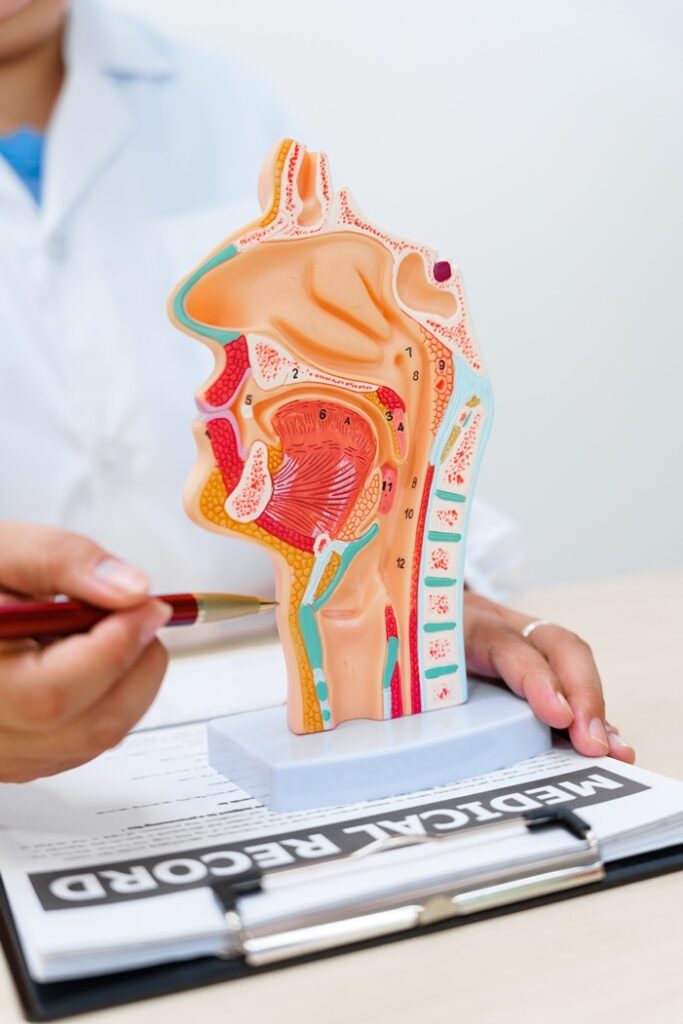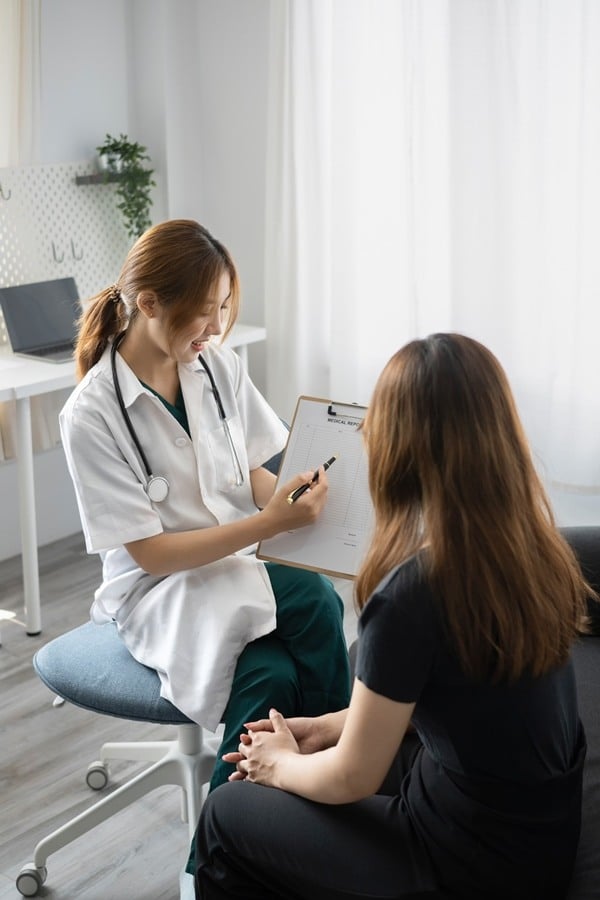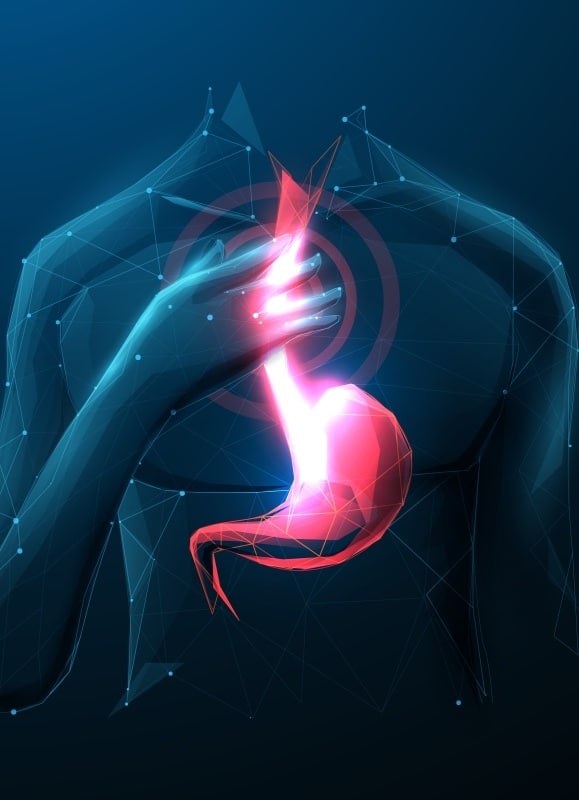Quick Links
You may be referred for an oesophageal manometry if your doctor or consultant wants to find out about any reflux, chest discomfort, and/or why you’re having difficulty or pain while swallowing. There could be a medical reason for your reflux, which oesophageal manometry would help clarify. This could include a problem with the sphincter muscle holding the bottom of the food pipe shut. It could also be an indication of underlying health problems.
This test is often performed in combination with reflux testing.
Call us on 0207 486 7777
or send an email
What does a manometry test show?
An oesophagus functionality test like this will use the catheter to measure the rhythmic muscle contractions that occur in your oesophagus while swallowing. The catheter will measure these contractions as well as the force and coordination of your oesophagus muscles as they move food into your stomach. Oesophageal manometry is helpful when diagnosing certain disorders that affect your oesophagus.
Following your test, your data will be analysed, and the results will be written up into a report. Your consultant will receive a copy of this report and will follow this up with you, with copies sent to your GP regarding outcomes and treatment options.
Note: Test analysis is complex, so getting the results may take some time.
Symptoms
Some of the more common symptoms you may be experiencing that lead you to being referred for a manometry test include:
- Problems with the oesophagus
- Problems with swallowing
- Unable to keep food and even water down.
The esophageal manometry high-resolution test will be able to investigate these problems and diagnose health problems to ensure suitable treatment is prescribed.
Helping to measure how well the muscles and nerves in the digestive system are working, the manometry test examines how the oesophagus squeezes food through its system; if the nerves aren’t functioning properly, food will be unable to pass through.
The pressure measurement is obtained along the entire oesophagus and both sphincters simultaneously, showing how well everything works and if the tube’s contractions are coordinated.
PATIENTS
Get an appointment with The Functional Gut and diagnose your gut problem.
CONSULTANTS
Refer your patient to The Functional Gut Clinic for diagnostic tests.

Preparing for the Test
The high-resolution esophageal manometry test will take approximately one hour, and you will be provided with detailed information before the test explaining what you need to do in order to prepare for the test.
For example, no eating or drinking 2 hours before your appointment.
You will also need to stop taking certain medications seven days before the test, others three days before, and some medicines will stop 24 hours before the test.
It is recommended that you attend your appointment in loose and comfortable clothing.
Call us on 0207 486 7777
or send an email
During the test
You will be asked to sit upright as a thin tube, with sensors (to measure contraction pressure), is inserted through your nose, down your throat and into your stomach.
There is no need for sedation, and you can breathe and talk normally throughout the procedure.
The tube is then connected to specialist equipment that helps to measure the pressure inside your oesophagus.
Any discomfort you feel will pass quickly, and our experienced team is always on hand to provide you with peace of mind.
Once the tube is in place, you must then lie down for the assessment to begin.
You will need to swallow small amounts of fluids at short, varied intervals (this can be repeated up to 20 times) so the clinician can take measurements from the pressure sensors on the tube, analysing the muscle contractions in the tube.
At the end of testing, you will be asked to sit upright, and the catheter will be removed gently and carefully.

After the test
All normal activities can resume after the test, and your results will be sent to your consultant, and you will be sent an outpatient appointment to follow up on your test results and discuss these in further detail.
After the test, it is not uncommon for you to be referred for a 24-hour pH monitoring study.
PATIENTS
Get an appointment with The Functional Gut and diagnose your gut problem.
CONSULTANTS
Refer your patient to The Functional Gut Clinic for diagnostic tests.

Potential Risks
The oesophageal manometry test is a safe procedure and is not painful; however, some patients may feel some slight discomfort.
Complications are extremely rare; some symptoms you may experience include:
- Mild discomfort
- Runny nose
- Medical spray to numb the nose can cause a stinging sensation
- Nosebleed
- Triggering your gag reflex
In extreme cases, the test can cause damage or perforation to the inside of the nose, throat, larynx, oesophagus, or stomach.
Specialist nurses and consultants will carefully monitor you throughout the procedure.
Please inform your consultant before the test if you are pregnant.
Call us on 0207 486 7777
or send an email
Benefits of taking the test
- One of the most significant benefits of opting for and being referred for a specialist high-resolution esophageal manometry test is that your consultant and GP will be provided with valuable information that can help them manage your symptoms with more clarity and provide you with the right medication and treatment plan going forward.
- The test helps to assess the strength and function of the muscle and valves in your oesophagus while you swallow.
- There is no other test that can provide this level of sophisticated information.
- It helps to decide the best treatment for you.
Why choose Functional Gut?
Helping you get to the bottom of all of your digestive health conditions, we are fully trained, experienced, and knowledgeable in gut health.
Carrying out the most suitable test to investigate your symptoms, all of our tests are performed to the highest quality standards.
We aim to make the whole procedure as quick and comfortable as possible and place patient care at the forefront of everything we do.
To find out more and book your appointment,

FAQ
What is an oesophageal manometry test?
A test that measures the inside of your oesophagus and the pressure of liquid and gas on this, using a manometer.
The test ultimately shows whether your food pipe is working properly or not.
How is an esophageal manometry performed?
The test involves inserting a thin, flexible tube called a catheter (2 – 3 mm diameter) through your nose, down the back of your throat into your oesophagus and stomach. A topical anaesthetic will be applied to your nose to make the passage of the tube more comfortable.
The tube will be positioned so that it has pressure sensors over the entire length of your oesophagus. Once in position, it will be taped to your nose for the duration of the test, but don’t worry, this will not affect your breathing.
During the test, you will be asked to take sips and swallows of slightly salty water and some food to allow us to see how the muscles are functioning. Recordings of oesophageal pressures will be made over about 10 mins and then the tube will be removed.
The results will be displayed as a wave pattern that can be analysed by our clinical team to see if your oesophagus is functioning normally.
How much does an oesophageal manometry test cost?
If you are paying for this test yourself and not through private medical insurance, the cost will be £1,060.
How do you prepare for an oesophageal manometry test?
There is some preparation required for your oesophageal manometry before you arrive at the clinic. This involves stopping certain medication and fasting. Please see our patient information leaflet for full details.
As a patient, you can make an appointment with us at The Functional Gut Clinic several different ways. You can:
Ask your consultant to refer you
Ask your doctor to refer you
Contact us directly and we can help
Consultant Referral
A referral to a specialist, health professional, or health service will typically come in the form of a letter from your GP.
Most GP referrals to specialists will last and remain in the system for 12 months.
Referrals are made so you can receive expert and specialist help to gain further diagnosis and treatment of your health problem.
Referrals are made to:
- A specialist doctor
- Health professionals
- X-ray/Radiology departments
- Pathology services

You can receive and request a referral from your doctor, dentist, nurse practitioners, midwives, physiotherapists, and psychologists.
You can also book an appointment with a specialist without a GP referral, however, it is always recommended that you check that this is possible, as every professional and specialist practitioner operates differently.

Medical Doctor Referral
Referrals from your GP last for 12 months and will cover a single course of treatment. If you need longer-term care for ongoing health conditions, your GP can request a referral for longer than the specified 12 months.
In addition, you can also request that your GP referral have no end date.
Note: All new health conditions will require new referrals. If your symptoms change or worsen, please talk to your GP again.
Specialists can refer you to another specialist if they believe it to be beneficial, and these referrals, once placed, are limited to 3 months.
If you would like a second opinion or another point of view, you can also request to be referred to another specialist. This option can help provide peace of mind and offer you information and a better understanding of alternative treatment options.
Don’t have a doctor or consultant? Contact us directly.
If you have reflux symptoms, such as heartburn, and want advice on what to next or how to get tested, contact us directly. The Functional Gut Clinic will provide you with names of recommended consultants. You can then choose the consultant you would like to make an appointment with, and they will refer you for testing.
What is included in a referral?
The medical referral letter includes information relating to your condition, treatment to date, and ongoing symptoms.
Information is transferred to and from your GP and specialist; all medical information is private and confidential.
Information in the GP referral letter will include detailed information and testing insights that have been carried out previously. All up-to-date information about your health problems, the date of the referral, the reason for the referral, and the name and contact details of the person putting forward the referral.
To obtain a referral, you must make an appointment with your GP, talk to them about your health issue, and request a referral to be placed with a specialist for further investigation.

Typically, the referral will be sent as a general specialist referral, however, you are able to choose a particular specialist if you would prefer.
You also have the option for private or NHS referral, and these options will be discussed with you during your GP visit.

Why choose Functional Gut?
Diagnosing your gut problem instantly, our specialist gut clinic helps you to take control of your gut health, providing you with the answers to your health problems.
Our range of diagnostic tests helps us to ensure a quick and accurate process as we focus on patient improvement outcomes.
We ensure we communicate with our patients, providing clear and concise information relating to the testing process, treatment options, and aftercare.
Patient safety is at the heart of everything we do, and we use our specialist knowledge and experience to ensure the best care for all our patients.
To find out more, visit our About Us pages.
Consultant Testimonials
Patient FAQs
How long does it take to get an appointment once a referral is made?
We will contact you within 24-hours of receiving your referral.
How quick are test results received?
Once we have performed your test, results are available within 5 days for most of our tests.
What is your success rate?
We have a very high success rate for invasive testing, so if you have struggled to tolerate a procedure elsewhere, please reach out to us.

